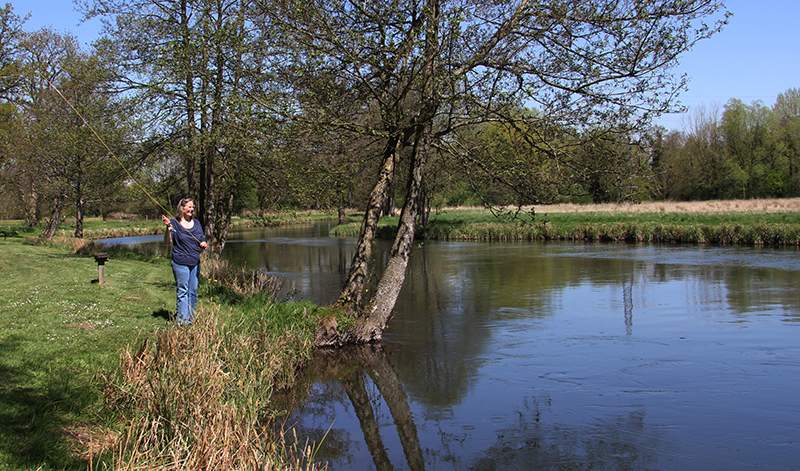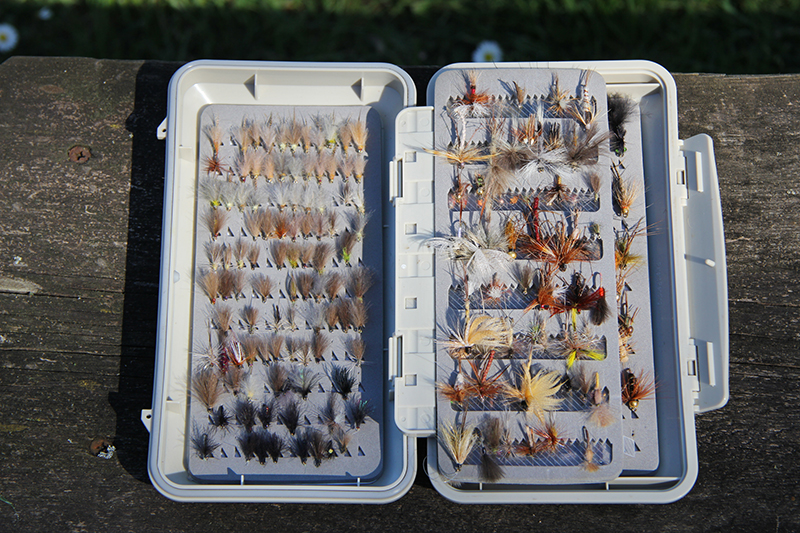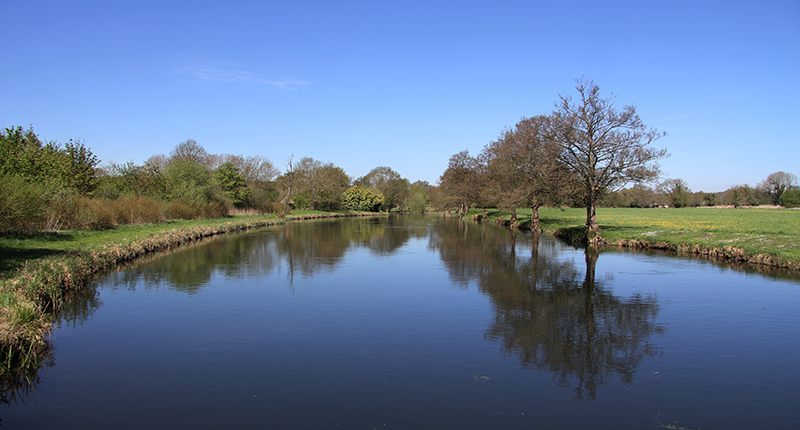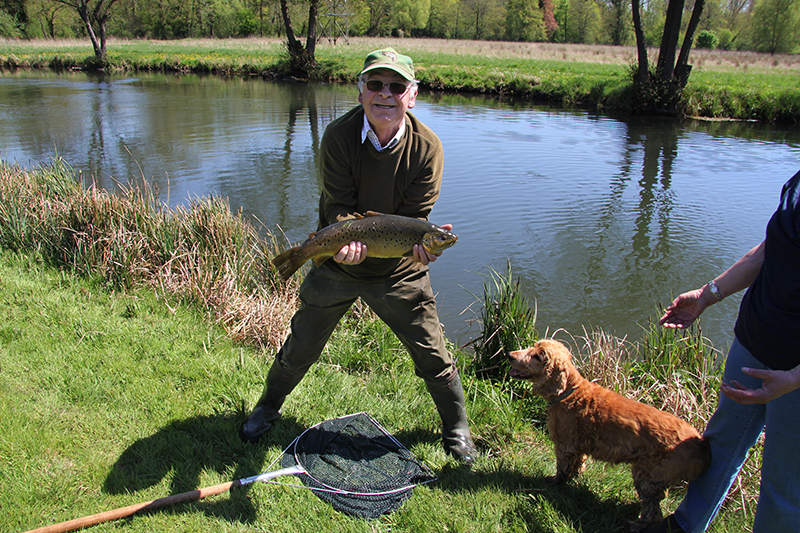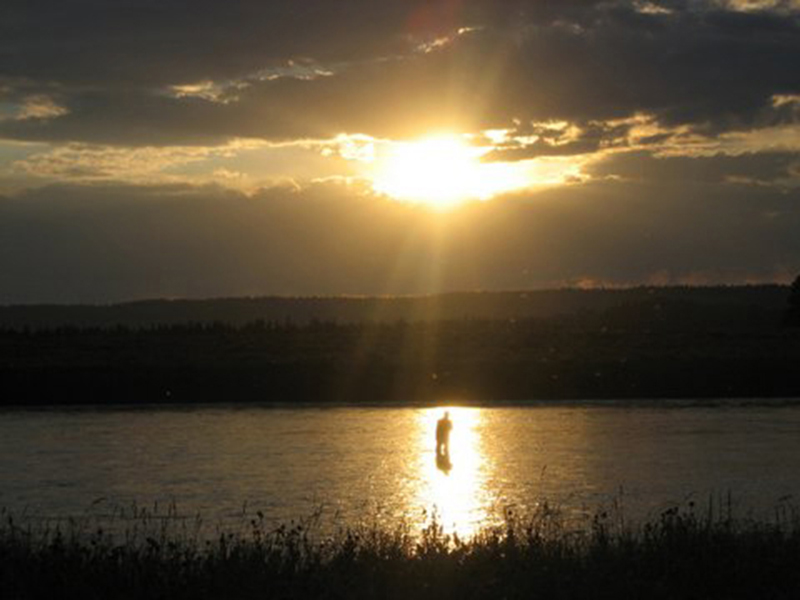To misquote Dr Johnson: “He who is tired of fly fishing is tired of life.” On the other hand (and there’s always two sides to everything) Paul O’Neil, the US economist, speaks thus: “There he stands, draped in more equipment than a telephone linesman, trying to outwit an organism with a brain no bigger than a breadcrumb.”
So why would someone purposely risk being outsmarted by a creature often less than twelve inches long? What makes a grown man (or woman) want to stand in cold water up to his thighs (or worse), waving a rod in the air and attempting to land a tiny confection of feather and silk on the nose of a rising trout, whilst simultaneously attempting to evade natural hazards such as brambles up the backside, splashes up the frontside and constant cries of “Have you got one, Mister?” from irritating passers-by.
Because, it seems, fly-fishing can hook you for life. To be on the banks of an English chalk stream, preferably in Hampshire, the sport’s spiritual home, on a hot Spring day in the midst of a blizzard of hatching Mayfly, with the sun on your back and a slight but helpful breeze behind your casting shoulder is to be in very heaven. Throw in a brace or two of plump brown trout, together with a monster that inevitably got away, and something chilled and sparkling in the back of the Bentley for later and you have sporting England at its best.
Forget worms or maggots. They are the stuff of coarse fishermen – hardy souls who hang round canals or stocked ponds, hunting muddy slabs of carp or chub. Fly-fishing pursues the aristocracy of fish: salmon, and brown or rainbow trout. And the fly-fisherman practices the noble art of artifice: trying to persuade the wily quarry that his hand-tied, delicately presented Mayfly (or Black Gnat, or Daddy Long Legs, or Tup’s Indispensable) really is an adequate substitute for that gossamer, ephemeral natural. Though some say that the difference between fly-fishers and worm dunkers is the quality of their excuses, others will claim that if fishing is like religion then fly-fishing is High Church.
So, fly-fishing has class, form, history. Wealthy Victorians employed a man to hold their tackle for them, as you do, while they awaited the first splashy rise. Eminent Edwardians wrote learned tomes about the merits of dry fly (where the artificial floats on the limpid water) versus wet fly (where it sinks beneath) or the new secret weapon of nymph fishing (the larval form of an unhatched natural). And today’s fisherman has access to an arsenal of boy’s toys, mostly in gunmetal graphite proving that modern marketing has penetrated even this ancient art. I must report that, having picked up a copy of Trout and Salmon, the fly-fisher’s monthly bible, I now realise I can’t live without a Loop S1 rod which uses ‘revolutionary technology…with high concentrations of spherical nano-sized silica particles that are able to flow between individual filaments of carbon fibre’. Wow!! Only a fool could fail. Alternatively, if I wish to be steeped in the traditions of the noble warrior I can have a divine, hand-spliced split cane in return for all my money and the lives of my children.
But, as with most things, the rule is never to admit how much anything really costs. “Oh this? Yes, I picked it up from a chap down the road. Got change out of a fiver!” It must be the nightmare of every fisherman that his wife, when he is dead, will sell his fishing gear for what he said he paid for it.
You’ll need very deep pockets for the foremost of English trout rivers – Hampshire’s River Test and River Itchen – which can command £300-500 a day in peak season (May and June). And the very best bits are strictly private, or let to small syndicates for up to £5,000 a rod per season (April 1 to October 15, depending on local river laws). If you have already passed the highest limits of Freemasonry, are of Royal blood or just a simple billionaire, you might get into the Houghton Club, based at Stockbridge, Hampshire, on the River Test. But again, you might not: there are said to be only 12 members, with Prince Charles an honorary 13th.
It needn’t break the bank. In the classified sections, you can find starter kits – a 9ft carbon fibre rod, reel, fly line, net, fly assortments – for £150 or less. A day at a stocked lake might be £25-40, which could give you a trout or three for tea. Up the stakes a little to a small river in, say, the West Country or Yorkshire and you’d get change from £50 and a fun day out.
But it’s not the equipment that draws us toward fishing. Here’s what enticed Herbert Hoover to leave home: “To go fishing is the chance to wash one’s soul with pure air, with the rush of the brook, or with the shimmer of sun on blue water. It brings meekness and inspiration from the decency of nature, charity toward tackle makers, patience toward fish, a mockery of profit and ego, a quieting of hate, a rejoicing that you do not have to decide a dammed thing until next week. And it is a discipline in the equality of men – for all men are equal before fish.”
I’m sure that the best fly-fishing is always a respite from burden. The fisherman is casting off the trials and tribulations of busy metropolitan life and returning to his cave-man roots to pit his wits against a noble quarry that first must be stalked before being lured by subterfuge onto the end of a specially crafted hunting implement. However, I suspect that game fish are entirely lacking in sporting integrity and would prefer to feed unmolested without themselves being eaten. As Harold Blaisdell (the fishing philosopher) said, “All the romance of trout fishing exists in the mind of the angler and is in no way shared by the fish.”
But this doesn’t deter the humanoid. Some say that troubles are forgotten on a trout stream but that’s not quite what seems to happen. It’s more that it becomes possible to appreciate where those troubles fit into the grand scheme of things and, suddenly, become less of a big deal. It’s the distance that is placed between the everyday cares and standing on a river bank, the release of the mind from usual rigour, the quietness without electronic interference. The ‘noise’ of modern life is replaced by the peace of Nature. As the fly-fisherman is brought close, face to face with the flower, the bird, animal and multitudinous insect life of the rich riverbank, the attention is switched full circle to tune with nature once again and our ancient, forgotten heritage.
Not surprisingly, there’s a softer, greener side to all this fishing business. The best fishermen regard themselves as guardians of the water habitat. Woe betide the polluter of the English chalk stream, which runs “as clear as gin and twice as expensive” as the saying goes. Today there is a new emphasis on catch and release, particularly of precious wild trout and salmon, rather than just bashing them on the head and taking them home for supper. Noble charities such as the Wild Trout Trust (which numbers Gareth Edwards, Jeremy Paxman, David Bellamy and Lord (David) Steel among its governing body) have made huge strides in restoring rubbish-strewn rivers and encouraging the survival of precious genetic lines of wild trout that may date from the Ice Age. You can even catch trout in some mining-town waters that 20 years ago still ran pitch-black and stinking.
And if you don’t catch, you can still cast like a scene from ‘A river runs through it’ against a setting sun, or wade waist-deep in water so clear you can count the pebbles on the bottom, or gasp in wonder as a hooked salmon leaps clear of the stream in a shower of silver. And if you can’t do that, you can always show your flies to a curious passer-by, especially the fly called the Tup’s Indispensable, which is tied with the pink hairs, hand-plucked from the testicles of a ram. What other sport has that? Fish on!

